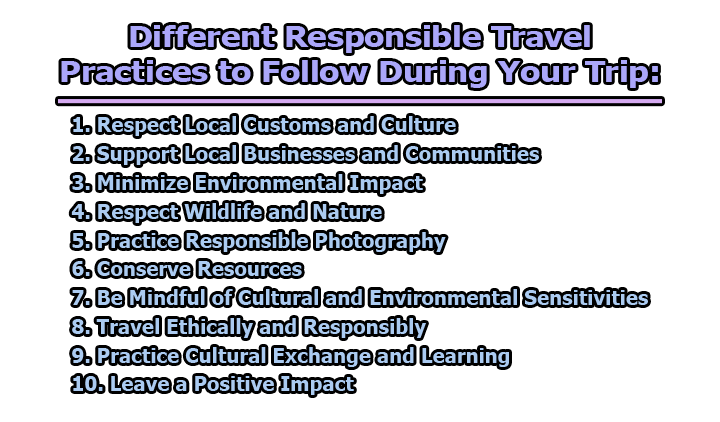Different Responsible Travel Practices to Follow During Your Trip:
Responsible travel is more than just exploring new destinations; it’s about making conscious choices that prioritize the well-being of local communities, cultures, and environments. As travelers, we have the power to positively impact the places we visit by adopting responsible travel practices. Here are the different responsible travel practices to follow during your trip:
1. Respect Local Customs and Culture: Respect for local customs and culture is foundational to responsible travel. Before embarking on your journey, take the time to research and understand the cultural practices, traditions, and social norms of the destination you’ll be visiting. This includes learning about appropriate attire, greetings, and behaviors in various settings. For example, in some cultures, it may be customary to remove your shoes before entering someone’s home or to cover your shoulders and knees when visiting religious sites. By respecting local customs, you show appreciation for the host community’s heritage and values, fostering mutual respect and understanding.
2. Support Local Businesses and Communities: Supporting local businesses and communities is a key principle of responsible travel. Opt to stay in locally-owned accommodations, such as boutique hotels, guesthouses, or homestays, instead of international chain hotels. Dine at family-owned restaurants and eateries that serve locally-sourced ingredients and traditional cuisine. When shopping for souvenirs, prioritize purchases from local artisans, markets, and cooperatives, rather than mass-produced trinkets imported from abroad. By patronizing local businesses, you contribute directly to the local economy, empower entrepreneurs, and preserve cultural traditions and craftsmanship within the community.
3. Minimize Environmental Impact: Responsible travelers strive to minimize their environmental footprint throughout their journey. This involves adopting eco-friendly practices such as reducing waste, conserving resources, and minimizing carbon emissions. Bring along reusable items like water bottles, shopping bags, and utensils to minimize single-use plastic waste. Choose accommodations and tour operators that prioritize sustainability initiatives, such as energy conservation, waste reduction, and water-saving measures. Opt for eco-friendly transportation options whenever possible, such as walking, cycling, or using public transit, to reduce reliance on fossil fuels and minimize air pollution.
4. Respect Wildlife and Nature: Responsible travelers prioritize the ethical treatment of wildlife and the protection of natural habitats. Avoid activities that exploit or harm animals, such as riding elephants, posing for photos with captive wild animals, or purchasing products made from endangered species. Instead, support responsible wildlife tourism initiatives that prioritize animal welfare and conservation, such as ethical wildlife sanctuaries, rehabilitation centers, or guided nature tours led by certified eco-guides. Respect wildlife viewing guidelines, maintain a safe distance from animals, and refrain from feeding or disturbing them in their natural habitats to minimize stress and disruption.
5. Practice Responsible Photography: Photography plays a significant role in travel experiences, but it’s essential to practice responsible photography to respect the dignity and privacy of individuals and cultural sites. Always seek permission before taking photographs of people, especially in intimate or sacred settings, and respect their wishes if they decline. Be mindful of cultural sensitivities and photography restrictions at religious sites, ceremonies, or events. Avoid intrusive or disrespectful photography practices, such as taking selfies or using flash photography in sensitive environments. By practicing responsible photography, you demonstrate respect for the subjects and locations you capture, preserving their integrity and cultural significance.
6. Conserve Resources: Responsible travelers prioritize resource conservation to minimize their environmental impact. This includes practicing water and energy conservation measures during your stay. Simple actions such as taking shorter showers, turning off lights and electronics when not in use, and reusing towels and linens help reduce water and energy consumption in accommodations. Additionally, be mindful of your waste generation by minimizing single-use plastics and properly disposing of recyclables and organic waste. By conserving resources, you contribute to the sustainability of the destination and reduce your ecological footprint.
7. Be Mindful of Cultural and Environmental Sensitivities: Cultural and environmental sensitivities vary from one destination to another, so it’s essential to be aware of and respectful towards local customs, traditions, and environmental concerns. Pay attention to cultural taboos, social etiquette, and environmental regulations to avoid inadvertently causing offense or harm. For example, some cultures may consider certain gestures or behaviors disrespectful, while others may have strict rules regarding environmental protection and conservation. By being mindful of cultural and environmental sensitivities, you demonstrate respect for the host community and contribute to positive cross-cultural interactions.
8. Travel Ethically and Responsibly: Ethical and responsible travel involves making conscious choices that prioritize the well-being of local communities, cultures, and environments. Choose tour operators and accommodations that adhere to ethical and sustainable practices, such as fair treatment of employees, support for local conservation initiatives, and respect for indigenous rights. Be mindful of the social, cultural, and environmental impacts of your travel activities and strive to minimize negative consequences. By traveling ethically and responsibly, you contribute to the preservation of cultural heritage, environmental conservation, and community empowerment.
9. Practice Cultural Exchange and Learning: Embrace opportunities for cultural exchange and learning during your travels to deepen your understanding and appreciation of the destination’s culture, heritage, and way of life. Engage with locals respectfully, ask questions, and participate in cultural activities and traditions. Take language lessons, cooking classes, or handicraft workshops to immerse yourself in the local culture and foster meaningful connections with the community. By engaging in cultural exchange and learning experiences, you gain valuable insights into different cultures and promote mutual understanding and respect.
10. Leave a Positive Impact: Responsible travelers aim to leave a positive impact on the destinations they visit and the people they encounter. Leave places better than you found them by participating in volunteer activities, conservation projects, or community development initiatives. Support social enterprises, fair trade initiatives, and sustainable tourism initiatives that benefit local communities and protect natural and cultural resources. Share your experiences and insights with others to inspire responsible travel practices and promote sustainable tourism. By leaving a positive impact, you contribute to the well-being of destination communities and leave a legacy of responsible and ethical travel for future generations to enjoy.
In conclusion, responsible travel is not just a trend but a mindset that fosters respect, empathy, and stewardship towards the places and people we encounter on our journeys. By adhering to principles such as respecting local customs, supporting local economies, minimizing environmental impact, and practicing cultural exchange, we can make a positive difference in the destinations we visit. Responsible travel is a transformative experience that not only enriches our own lives but also leaves a lasting legacy of sustainability and respect for future generations of travelers. As we embark on our adventures, let us embrace the ethos of responsible travel and strive to leave a positive impact on the world around us.

Assistant Teacher at Zinzira Pir Mohammad Pilot School and College










